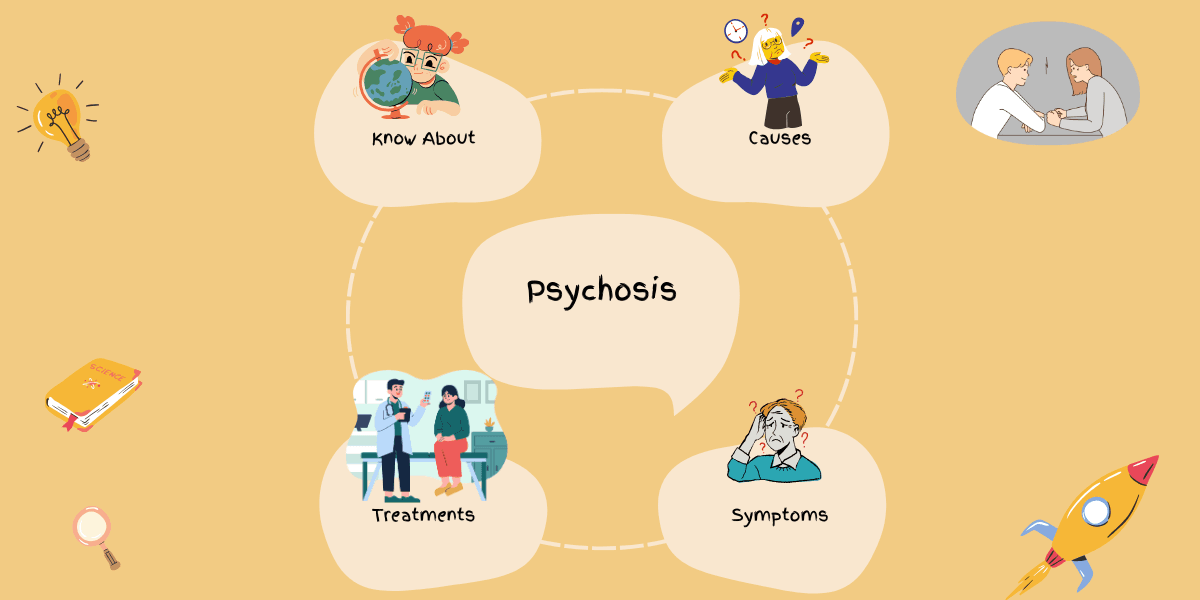Psychosis: Causes, Symptoms, and Effective Treatments

Overview:
Psychosis is a term used to describe a mental state in which an individual experiences a loss of contact with reality. This can manifest in a number of ways, including hallucinations, delusions, and disordered thinking. Psychosis is a symptom of a number of different mental health conditions, including schizophrenia, bipolar disorder, and depression. It can also be caused by certain medical conditions, substance abuse, or as a side effect of certain medications.
Symptoms
Symptoms of psychosis can vary depending on the underlying cause, but generally include hallucinations, delusions, and disordered thinking.
Hallucinations: Hallucinations are false perceptions of things that are not actually present. They can take the form of hearing, seeing, or feeling things that aren’t there. For example, an individual experiencing auditory hallucinations may hear voices or sounds that others do not hear. A person experiencing visual hallucinations may see things that aren’t there, like people or animals.
Delusions: Delusions are false beliefs that an individual holds despite evidence to the contrary. These can take many forms but are often paranoid in nature, such as believing that others are out to get them, or that they have special powers or abilities.
Disordered thinking: Disordered thinking is characterized by a break from reality, and can manifest in a number of ways, including difficulty following a conversation, making connections between thoughts, or having a hard time understanding reality.
Other symptoms of psychosis may include a change in speech patterns, lack of motivation, changes in emotions and behavior, and difficulty with daily activities. It’s important to note that not everyone who experiences psychosis will have the same symptoms and the severity of the symptoms can vary from person to person.
Causes & Risk Factors:
The causes of psychosis can be complex and multifactorial. Some of the most common causes include:
- Schizophrenia: This is a chronic mental disorder characterized by psychosis, disordered thinking, and a loss of contact with reality.
- Bipolar disorder: This is a mental disorder characterized by periods of elevated mood (mania or hypomania) and periods of depression. Psychosis can occur during manic or depressive episodes.
- Depression: Depression is a common mental disorder that can be associated with psychosis in some cases.
- Medical conditions: Certain medical conditions, such as brain tumors, infections, and head injuries, can cause psychosis.
- Substance abuse: The use of certain drugs and alcohol can cause psychosis.
- Medications: Some medications can cause psychosis as a side effect. Risk factors for psychosis include a family history of psychosis, a personal history of mental health conditions, and exposure to certain environmental stressors such as poverty, trauma, and social isolation.
Treatment
Treatment for psychosis typically includes a combination of medication and therapy. Antipsychotic medications, such as risperidone, olanzapine, and quetiapine, are most commonly used to treat psychosis. These medications can help reduce symptoms such as hallucinations and delusions, and can also help improve disordered thinking. Therapy, such as cognitive behavioral therapy (CBT) and family therapy can also be helpful in managing psychosis.
Medication: Antipsychotic medications are the most commonly used medications to treat psychosis. They work by blocking certain receptors in the brain that are thought to be involved in psychosis. These medications can help reduce symptoms such as hallucinations and delusions, and can also help improve disordered thinking. Some of the most commonly prescribed antipsychotics include risperidone, olanzapine, and quetiapine.
Conclusion: Psychosis is a serious mental health condition that can have a significant impact on an individual’s life. It can be caused by a variety of factors, including
At Careme Health, we understand that every individual experiencing psychosis is unique and requires a tailored approach to treatment. Our team of mental health professionals works closely with each patient to provide customized, evidence-based treatment plans that aim to alleviate symptoms and improve overall functioning. We believe in providing affordable, accessible care for all individuals, and strive to make our services as cost-effective as possible without compromising on the quality of care. With our commitment to providing the highest standard of care, we are dedicated to helping individuals with psychosis achieve the best possible outcomes.
Related Articles

Letting Go With Grace: Emotional Tools for Closure
Letting go is never easy. Whether we are parting ways with a loved one, ending a relationship, leaving a job, or saying goodbye to a cherished chapter of life, the emotional weight can feel overwhelming. Yet, closure is essential for our emotional well-being. Without it, we carry unresolved grief, anger, regret, or longing that can seep into new relationships and experiences, holding us back from healing and growth.

Breakup Blues: How to Cope and Rebuild Your Self-Worth
A breakup often feels like a silent earthquake—unseen by others but devastating within. The pain doesn’t just come from the loss of a relationship, but from the crumbling of the life, identity, and future you built with another person. You may find yourself questioning your worth, doubting your value, and feeling isolated even when surrounded by people. In Indian society, where emotional expression is often discouraged and breakups can be stigmatized, this pain may feel even more overwhelming. But the truth is—while breakups may shake you, they do not define you. You are not broken; you are in a process of emotional reformation. And with the right tools, guidance, and support system, you can rebuild not just your self-worth but also your entire life narrative.

Healing After Heartbreak: A Mental Health Perspective
Heartbreak doesn't just break your heart—it can shatter your sense of identity, peace, and purpose. Whether the end was expected or abrupt, mutual or one-sided, short-lived or long-term, the aftermath often leaves people emotionally disoriented. In Indian culture, where societal expectations and family involvement in romantic relationships are prevalent, the pain is not just personal—it is public. Yet, very few are taught how to heal from emotional loss in a healthy, sustainable way.

Boundaries in Love: Saying ‘No’ Without Guilt
Love, in its truest form, should be a safe space—a space where individuality is not only respected but celebrated. Yet, in many relationships, especially in the Indian cultural context, love is often misunderstood as constant availability, complete sacrifice, and putting the other person first, always. As noble as this may sound, this version of love often leads to emotional exhaustion, suppressed resentment, and the erosion of one’s identity.

Gaslighting in Relationships: What It Is and How to Heal
Gaslighting is a form of emotional abuse that erodes your ability to trust your own perception. It’s a slow, insidious process that often begins with subtle doubts and ends with complete self-questioning. In romantic relationships—especially in the Indian context where silence, compromise, and duty are often mistaken for love—gaslighting can be even harder to recognize.

How Depression Can Affect Your Relationship—And What You Can Do
Depression is not just an internal struggle—it ripples outward, affecting relationships, routines, and the emotional fabric that holds people together. When someone is dealing with depression, it's not only their world that becomes dim—it can cast a shadow over their most intimate connections too. In a country like India, where open conversations about mental health are still rare and love is often equated with endurance, depression within a relationship can become invisible, misunderstood, or misjudged.
